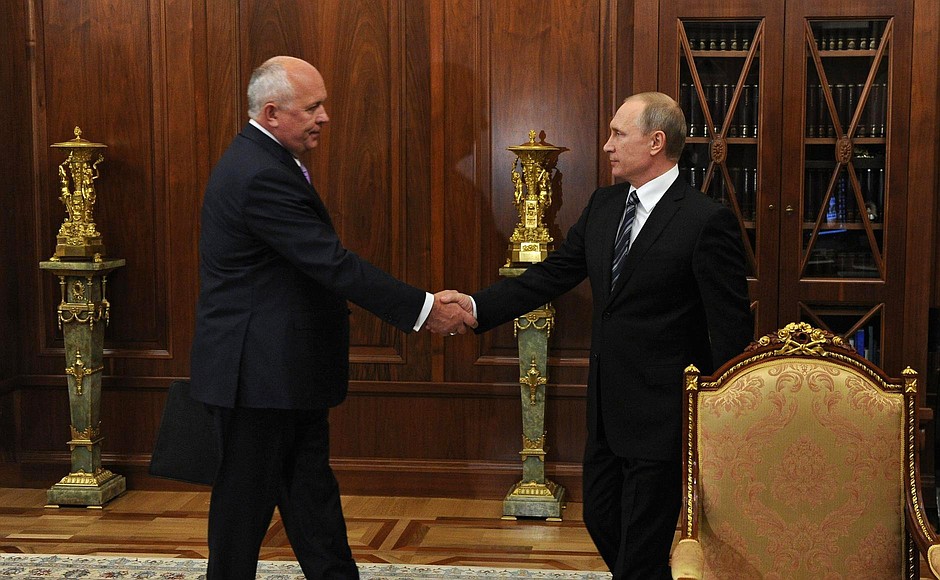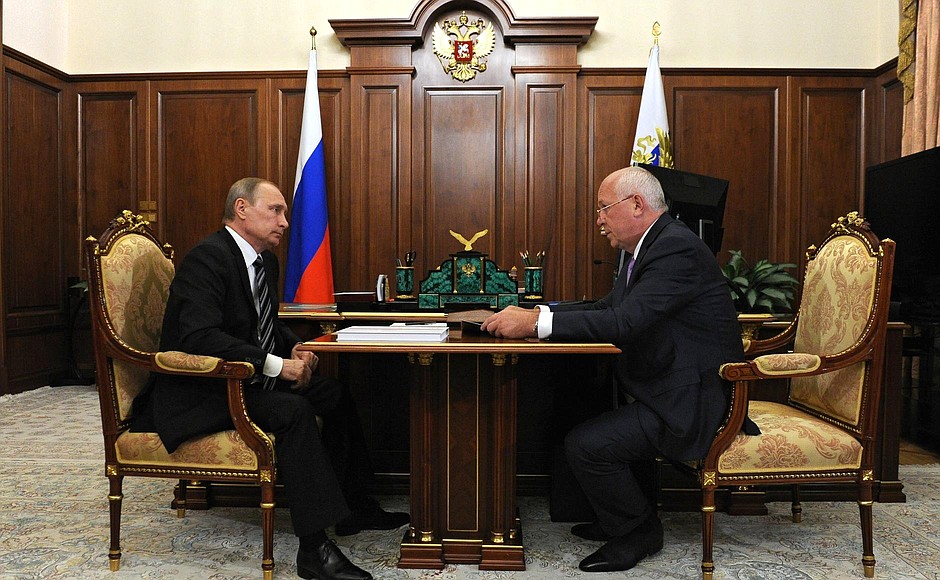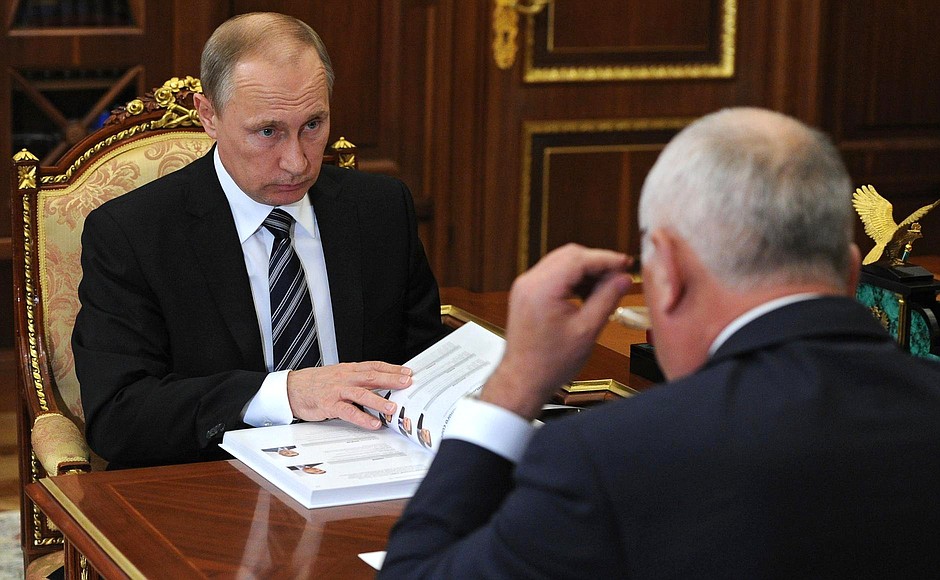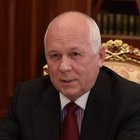Rostec State Corporation CEO Sergei Chemezov: Today I would like to present to you the Rostec Corporation annual report for 2015.
President of Russia Vladimir Putin: Yes, please.
Sergei Chemezov: Our companies have performed well despite the difficult economic situation, the unfavourable macroeconomic environment and the sanctions that have affected our businesses. Our revenues grew by 18 percent to 1.14 trillion rubles. Eighteen percent is a good indicator. To compare with the GDP: while the GDP fell by 3.7 percent, we had an increase of 18 percent.
Performance indicators have also shown strong growth, with the EBITDA margin climbing nine percent, and our net profit margin nearly six percent.
Another important indicator is labour productivity. Output per employee increased by 17 percent to over 2.5 million rubles.
I would like to emphasise that we did not have to cut investment or social programmes to achieve this rise in our performance indicators. Investments totalled 129 billion rubles in 2015, an increase of 21 percent. I would like to stress that only 27 billion of the 120 billion came from the federal budget; the rest came from our own funds.
We have maintained our personnel numbers at the same level; if anything, the team increased slightly (by 1 percent) to 445,000 people. Average wages also rose, to about 41,000 rubles – a good indicator.
Vladimir Putin: How big is the increment?
Sergei Chemezov: Eleven percent compared to 2014.
The key business events in 2015 included…
Vladimir Putin: What was the increase in labour productivity again?
Sergei Chemezov: Seventeen. In other words, despite the difficult economic situation and the sanctions, all the enterprises performed well. We believe that 2015 was a good year for us.
So, the major business events in 2015 included the first export contract for the Su-35 aircraft through Rosoboronexport (we have sold 24 aircraft to China) and an agreement with our Indian partners to set up the production of Ka-226 helicopters and their modifications in India (so far we have agreed on 200 craft, but can double this figure in the future).
Vladimir Putin: The small helicopters?
Sergei Chemezov: Small helicopters, yes. They are multifunctional and can be used by the police, to carry passengers, or as transport vehicles – various modifications are possible here.
We have established Yota Devices Company; I showed you the mobile handsets we make. This is a startup. We built this company in three years, and over those three years, the company's value has grown to nearly $130 million. We sold 30 percent (one-third) to a Chinese company for 46.2 million.
In 2015, the Kalashnikov concern showed a profit for the first time in many years. We have a public-private partnership there. When three years ago you gave us permission to attract private investors to that company, Kalashnikov was practically on the verge of bankruptcy. Now for the first time since then, the company received a net profit of 2.1 billion roubles. It is now a modern, forward-looking facility, with all sorts of new models added to its product line.
The most significant innovation-related results were the successful completion of state testing of innovative electronic warfare systems, and the certification testing of the Mi-38 mid-range helicopter; the PD-14 engine is being tested now, with the first phase close to an end. I hope that if it is successful, we will be able to complete all the tests in 2016–2017, and begin production in 2018.
Furthermore, we launched the production of two fundamentally new Russian car makes, the Lada Vesta and the Lada Xray. They are very popular, and sell very well. They are in great demand because they meet the modern market requirements.
We have developed a highly mobile automated control, navigation, landing and communication system for airplanes and helicopters to be deployed on temporary sites. This greatly increases the mobility of our armed forces. Another innovation is a universal model of on-board electronic systems for unmanned aerial vehicles.
One of the key features of 2015 and the highlight of the annual report was the corporation's new development strategy until 2025 approved by the Supervisory Board. A major component of the new strategy is an ambitious revenue growth rate of 17 percent per year. In 2015, we already grew by 18 percent.
Although this is a very serious challenge, this ambitious growth rate is the only way we can match the development level of our global competitors. I hope that by 2025, we will become one of the world's top ten companies.
Another priority should be to increase the share of civilian products by 2025 to exceed 50 percent of total revenue.
The first step towards the implementation of the renewed strategy in 2015 was the holding companies’ consolidation by industry clusters: the aviation cluster, the electronics cluster, the automotive cluster, the weapons cluster and the bio-cluster. The steps taken in 2015–2016 helped improve the quality of management and raise interaction between the holding companies to a new modern level.
The report also presents around 30 innovative products of the state corporation, those that we have already put into production.
With regard to social responsibility, in 2015, we developed and approved the corporation’s housing programme with funding of over a billion rubles in 2015.
A programme of cooperation with universities is also underway. We have been cooperating with 312 major universities across Russia and have established 294 special departments in these schools to train professionals who would later work for our company. The graduates have received their degree certificates and will soon begin working at Rostec. They have obtained their master’s degrees from our department at the Moscow Institute of Physics and Technology (MIPT).
We also actively support sports and socially significant events in Russia, such the 8th International Military Music Festival Spasskaya Tower on Red Square in 2015, which featured brass bands from all over the world. This year we will sponsor the 9th festival as well.
<…>



